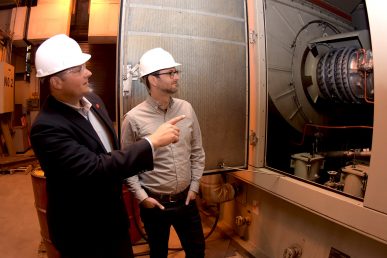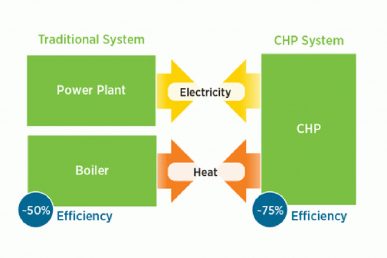US Dept. of Energy grant to advance combined heat and power systems in the Midwest
The University of Illinois at Chicago has received a five-year, $4.2 million grant from the U.S. Department of Energy to help industrial, commercial, institutional and utility entities evaluate and install highly efficient combined heat and power (CHP) technologies.
CHP, also known as cogeneration, is a single system that produces both thermal energy and electricity. CHP has typical operating efficiencies of 65 percent to 75 percent or greater compared with more conventional and separate systems for electricity and heat, which operate at approximately 50 percent efficiency. CHP can run on conventional fuels, such as natural gas, or renewable energy sources, such as synthetic gas and biofuels.
The technology has been around for decades. In fact, Thomas Edison’s Pearl Street Station, the world’s first commercial power plant that began operating in 1882, was technically CHP — it produced both electricity and thermal energy while using the recovered heat to warm neighboring buildings.
UIC’s Energy Resources Center has been funded by the Department of Energy since 2001 to help promote CHP technologies and concepts and to assist companies and institutions in the Midwest to evaluate CHP opportunities. With this new award, UIC will manage one of the eight U.S. Department of Energy’s regional Combined Heat and Power Technical Assistance Partnerships (CHP TAPs) — the Midwest CHP TAP. It will support the Midwest region, covering Illinois, Indiana, Iowa, Kansas, Michigan, Minnesota, Missouri, Nebraska, Ohio and Wisconsin.
“Our group essentially does three things as a CHP TAP,” said Cliff Haefke, director of the UIC College of Engineering’s Energy Resources Center. “We conduct market opportunity analyses identifying which markets in our region make sense for CHP, we provide education and outreach to various stakeholders on the concepts, technologies, and benefits of CHP, and finally, we provide technical assistance to organizations that are looking to evaluate CHP at their own facility.”
Some of the institutions the Energy Resources Center’s CHP TAP group has assisted include Argonne National Laboratory in Lemont, Illinois; Glenbard Wastewater Authority in Glen Ellyn, Illinois, and Gundersen Health System in Onalaska and LaCrosse, Wisconsin.
Another directive of the CHP TAPs is to boost the resilience of local power grids that can be vulnerable to damage by natural disasters.

Cliff Haefke, director of the UIC Energy Resources Center (left) and Graeme Miller, a policy analyst in the ERC (right) analyzing the 7 Megawatt CHP combustion turbine at the UIC West Campus Utilities Plant.
“When institutions install CHP technologies, they help their facilities increase their own resiliency with on-site generation and can help take some pressure off of aging regional power grids. Because CHP users can generate their own electricity and heat, they can also help improve the resiliency of utility companies providing power, for example, during surges in electric demand, such as during heat waves when a lot of cooling equipment is being operated by multiple customers,” said Haefke. “Considering we have been experiencing more weather-related disasters impacting various utilities, on-site generation with CHP technologies can be a greater asset to entities than ever before.”
The use of CHP can support U.S. economic competitive advantage, promote economic development and create and maintain local energy-related jobs. “There are just so many benefits to using CHP,” said Haefke. “Through the CHP TAP program, we hope to transform the market for CHP concepts and technologies throughout the Midwest Region over the next five years.”
Other Energy Resources Center staff who support the CHP TAP are David Baker, Graeme Miller, Patrick Brown, Ben Campbell, Stefano Galiasso, Jennifer Klemundt and Sam Rinaldi.

